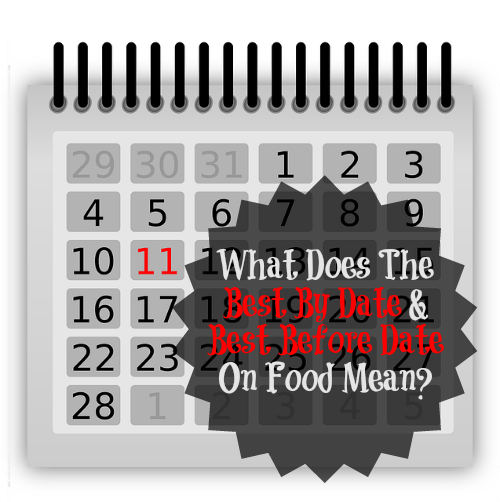What Is the Difference Between Before and Use by Date on Food?

Date Marking - Best By Date, Best Before Date, Use By Date
Use By Date. Best Before Date. Sell By Date.
So many dates. Do they even matter?
Maintaining food safety is paramount. Understanding the meanings and use of many key date marking terms is critical to ensuring our health is maintained.
Terms such as best before, use by and sell by, are stamped onto products, packaging, tags and labels; but that do they even mean?
Are they even more confusing due to the fact that date marks may mean different things in different countries and if we import food from overseas, how to their dates impact us?
The modern world has brought with it an enormous production of and reliance on pre-packaged foods. Making use of a myriad of additives and preservatives, lengthens the shelf life of these foods and allows for exportation around the world, however the confusion between commonly used terms continues.
Are there regulations and controls over their use? Which term means what? How do their uses affect the way we eat?
Let's go on a journey together to once and for all unlock the hidden secrets and meanings behind date marks. It must be remembered, however, that these terms refer to unopened products only. Once a sealed product has been opened, their usage timeframes differ all together.
Use By Date
A Use By date is a term referring to the safety of a product. Foods that have a specific use by date marked on their packaging, tag or label must not be eaten after the date specified as the food may be become dangerous to eat. It may have spoiled, for example.
This date is also known as an expiration date.
If you find a product in your home with a date passed its use by date, best advice from the manufacturer is to throw it away.
Eggs - Exception to the Rule
Eggs have their own rules all together. Because eggs can contain salmonella they should never therefore be eaten after their best before date. This is because salmonella grows over time.
Their best before date is typically no more than 28 days after the egg has been laid.
Best Before Date
A Best Before date means that the product may have lost some of its quality, flavor, appearance or nutrition after that date however it can still be sold or eaten after that date. Quality, not safety is paramount here.
Also referred to as Best By, these dates typically appear on a wide range of products including frozen, canned and dried foods.
These dates are advisory dates.
Sell By and Freshness Dates
There are some other less commonly seen dates on products, namely 'Sell By' and 'Freshness' dates.
- The Sell By date is a date typically referred to by store owners to make sure a product is sold by that date. There is generally still some room for its use when purchased by a consumer. For example, some dairy products have a sell by date, however if stored properly once home, it can still be good if consumed within a few days.
- A Freshness or Guaranteed Freshness date is most often seen on bread products. This is similar to a Use By date. Freshness is not guaranteed after this date but you can still eat it. Bread my be old and hard, for example, however it can still be used to make breadcrumbs (except when mould is seen).
What is shelf life?
Shelf life can be simply defined as the length of time that food products (including medication) and perishable items have before they are considered not fit to be consumed or sold. Many supermarkets and grocery stores make a conscious effort to rotate stock on shelves to as to ensure the older products with the shortest remaining shelf life are at the front; fresher items sit to the rear.
This term can also be interchanged with best before dates. In both cases they differ from a use by or expiration date as they do not reflect food safety, only food quality.
Guidelines
Looking at the guidelines within the US and Australia alone, as comparisons, bring significant differences.
Within the US, date marking on products is not required by US federal law. The exception only being on infant formula and baby food which is required to be withdrawn from sale by their expiration date.
For all other foods date marking is voluntary. Manufacturers can choose to, or not to, date mark their products. Depending on which state you live in, you may see a best before, or a sell by date on products or nothing at all.
Is this a case of buyer beware in the US?
Within Australia, all products with a shelf life greater than 2 years are required by law to be date marked.
Tip
Use food labels or markers to remind yourself when a product is opened. Make a note of the date opened and the date to dispose of. This will help when doing a quick clean out of your fridge and cupboard.
Food Safety
Once a food product has been opened or its original seal broken, it is critical to know that their original date markings in many cases are now obsolete.
This is commonly seen on some labels which state ' Consume within 7 days of opening'. The use by or best before date of this product may still be months into the future, however now that it is open, those dates are to be ignored.
Why? Purely and simply because the product is not considered to be perishable; changes to its environment such as exposure to air, light and heat differ from the point in which it was manufactured.
Here are a few hints and tips to follow:
Food storage tips and hints
- When buying products check for yourself their use by or expiration dates. This can determine how or when they are used in your home.
- After opening, a product is perishable. Refer to label for usage dates or use it as quickly as possible. Ignore previously referred to date markings.
- If you are advised to 'Refrigerate After Opening' do so. Check packaging carefully.
- Rotate your own pantry or refrigerator stock. When re-stocking your shelves, move items to the front that are due to expire earlier.
- Avoid dented cans. Always.
- If you have purchased foods from a refrigerated area in a supermarket or grocery store, make sure you return home and store it properly as soon as possible.
- Freeze items that you are unable to consume before their expiration date. Once frozen, you can generally ignore the date it expires because foods kept frozen continuously are safer longer. Note: If you notice grey or white spots on frozen foods, this is called Freezer Burn and occurs because of foods that are not properly wrapped. It does not mean the food is unfit to eat however it can taste spoiled. Probably best not to eat.
Regardless of the advice given by anyone, always trust your senses.
If it looks bad or smells bad, throw it away. Trust your instinct!
Perimeter Shopping
Next time you are at the supermarket, consider shopping around the perimeter. You'll be amazed at what you will find.
One of the most used pieces of information on a food label is date marking, however most consumers would say that they are not exactly sure what it means.
In Australia, the two most commonly seen date marks on products are Best Before and Use Buy however these can differ greatly depending on the country of manufacture.
Date marking will only work 'properly' if the food is stored according to its instructions on label.
If in doubt throw it out!
All Hubs are Original Material by 'Work At Home Mums' ©
This content is accurate and true to the best of the author’s knowledge and is not meant to substitute for formal and individualized advice from a qualified professional.
© 2012 WorkAtHomeMums





